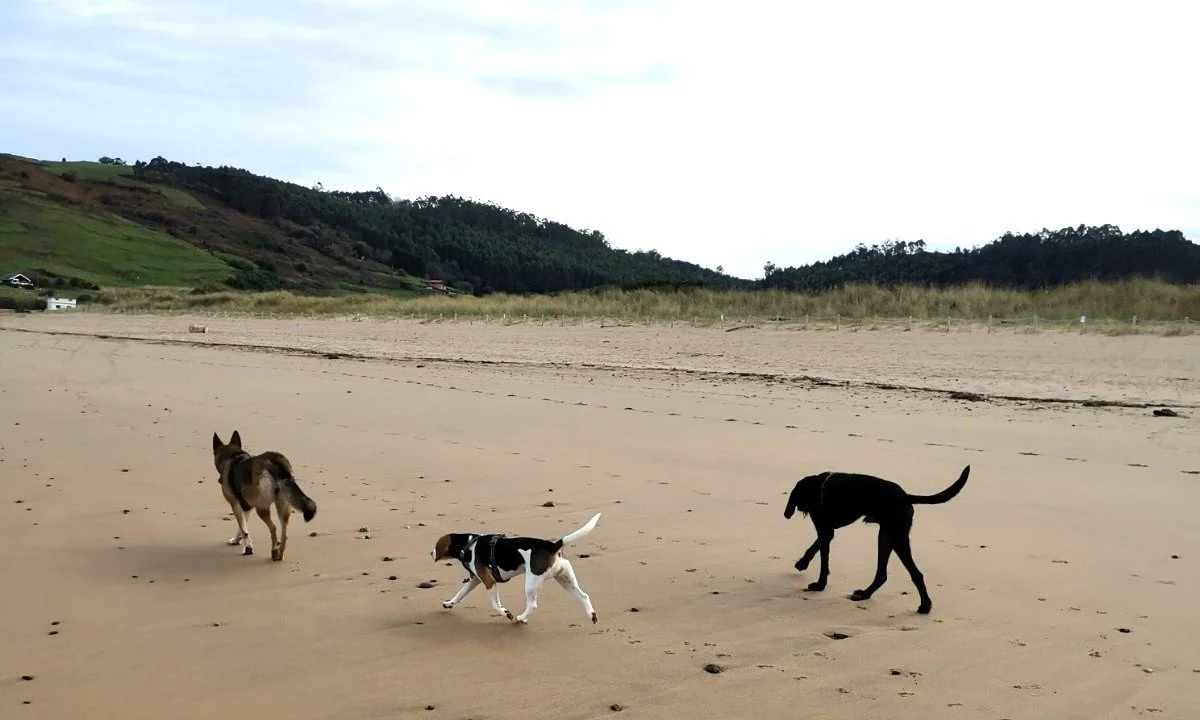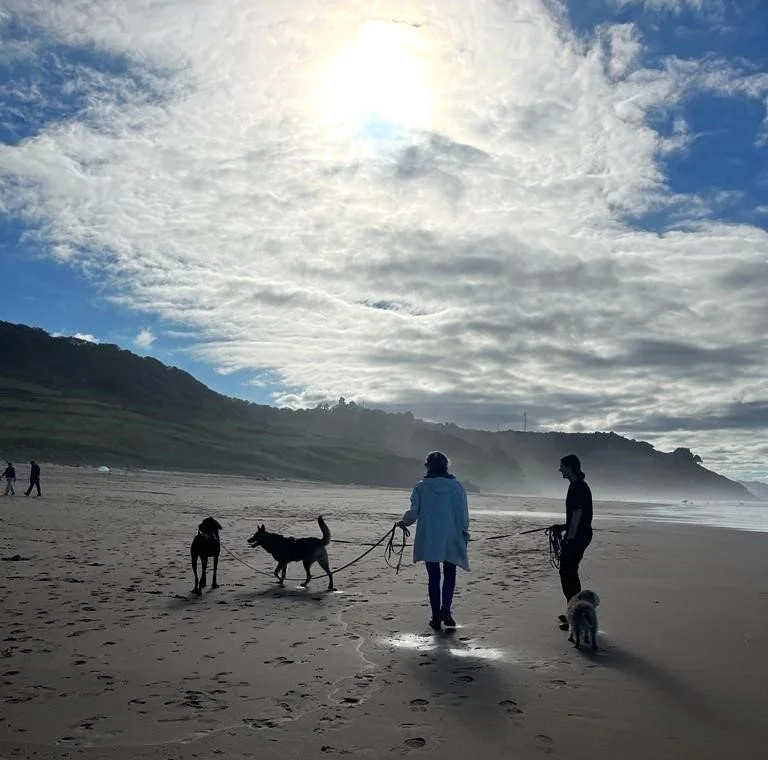The importance of meaningful relationships
We welcome a special guest writer to the Smiling Leash project! This article was written by our good friend Clara López-Brea, a dog behaviour specialist in training, who shares our values and vision of sharing a life with a dog. Clara is the caretaker of Sombra who you might have already seen on our pages and articles and we are thrilled to share her thoughts with the world. Enjoy!
A common misconception
Before diving into the importance of providing our dogs with opportunities to develop, cherish, and enjoy meaningful relationships, it's worth noting that while dogs are indeed gregarious animals, there are common misconceptions about how to fulfill their social needs in a manner that's both healthy and meaningful. Dogs, like humans, thrive when surrounded by positive influences, genuine interactions, and a community they can trust. They don't necessarily need a large group; a small circle of canine and human friends is often enough for them to feel connected and secure.
Best Friends Sombra and Rufus calmly enjoying each other’s company
It's a widely held belief — though fortunately, this is changing — that our dogs need to befriend every dog they encounter and enjoy interacting with every human that approaches them. From puppyhood, they're often expected to socialize with as many dogs as possible to become a happy, balanced, and well-socialized dog. However, let's draw a parallel with humans for a moment: we don't befriend every person we meet, and we certainly don't need to like everyone we come across. Much like us, some dogs might be social butterflies relishing the company of many, while others might be more reserved, cherishing only the bonds with their closest friends. However, every dog has the need and the capability to maintain social relationships with other dogs and humans they like.
With the understanding that every dog is an individual and has distinct social skills and needs, let's get into some of the things we can do to help them develop meaningful relationships.
Great friends Rufus, Blue and Sombra having a good time at the beach together
What can we do to help dogs develop meaningful relationships?
Look for an ethical dog community nearby, you want your dog to be surrounded by understanding and likeminded humans and their dogs, this will help with avoiding short leashes and collars, which will interfere with their communication and add stress to any dog-to-dog interaction. See if there are social walks being organized, if there aren’t, make it happen. To start with you don’t need many dogs, one dog is enough to start arranging social walks with your own dog, and of course, others might naturally join later as you develop a community.
For more on social walks read our previous post on the topic and Turid Rugaas Social walks article:
Social Walks
Turid Rugaas on Social walksIf your dog, or any other dog you are meeting, is insecure or has had bad experiences in the past involving other dogs or people, the need for meaningful relationships becomes even more critical. However, you'll need to take things slow initially. Opt for interactions at a distance the dog can manage calmly to help them feel comfortable, and start communicating and getting acquainted with potential future friends before gradually reducing the distance at the dog's needed pace. Parallel walks are one of the best tools we have for introducing dogs that are insecure, nervous, or overly eager to interact.
For more on parallel walking, how to do it properly, and its benefits, read our previous post on the topic:
The Wonder of Parallel Walking
Because dogs are naturally social, polite, and curious, taking the time and care to help them adapt can yield wonderful results. You'll see them start to get comfortable around each other, begin to explore together, and bond. In many cases, when they become close, they may even start to help each other with the challenges they might encounter on their walks. No one does a better job of helping and teaching a dog than another experienced dog.
Sombra and her senior friend Barney
When choosing social walking partners, keep in mind that friendship has no age restrictions. In fact, puppies and teenagers can greatly benefit from meeting with older dogs who can act as role models. These older dogs can teach them about the world, as well as how to be calm around other dogs and cope in various environments. Older dogs also benefit from these relationships, as they can bring them joy and infuse them with a touch of playful youth.
Apart from parallel walking, there are other activities that can enrich our dogs' lives and contribute to building meaningful relationships. For instance, enriched environments and treat searches encourage exploration and the use of their wonderful noses. These species-specific behaviors are not only enjoyable but also beneficial for their mental and overall health. Given the opportunity, dogs will love sharing these moments with their friends—think of it as if you're going to the movies or a museum with your loved ones.
Another aspect to be aware of is that, while play is a natural part of social interactions and can be beneficial, it's essential to closely observe play behaviour. If a dog is constantly being chased without reciprocating, or shows signs of stress or fear, this may indicate that she is not comfortable enough to engage in play with that particular dog. It could also suggest that the other dog is being a bully. Yes, just like humans, dogs can be bullies too. In these cases, it's important to advocate for the well-being of all dogs involved and make the necessary adjustments.
Once your dog has made a friend (or some friends), make it a point to meet up with them often. Dogs love to be social and thrive on stable relationships. From the human perspective, it's heart-warming to see how these canine friends greet each other and get along so well, communicating, exploring, and calmly enjoying each other's company. Once you experience this, let us know how it goes. If you're keen, send us your pictures and videos of these social "Smiling Leash" interactions so we can continue spreading the word.
By Clara López-Brea
Rufus, Sombra & The very missed Barney, Also Leti, and Myself on the other side of the long leashes




